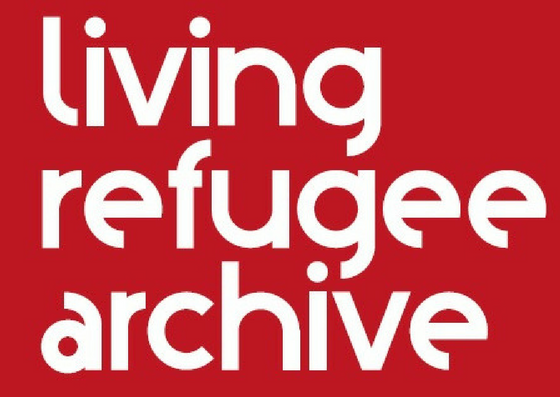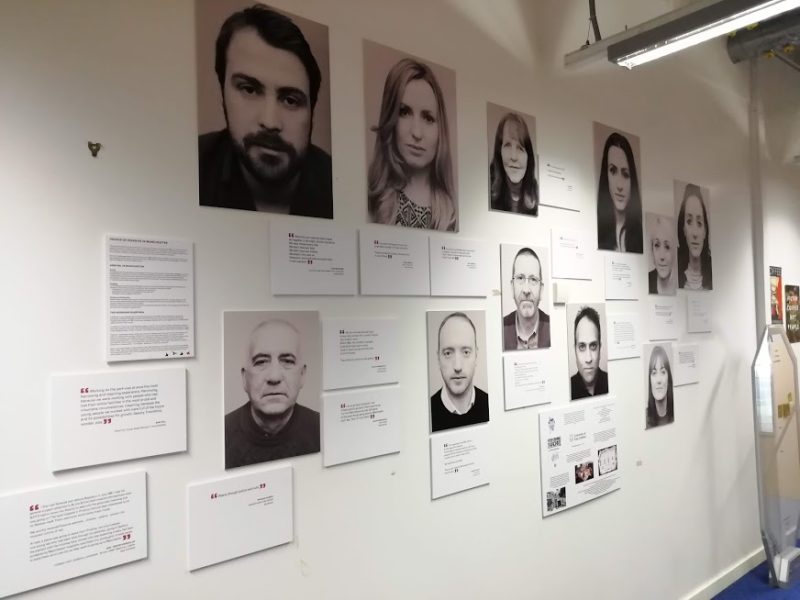Documenting the Undocumented: Archiving and recording the refugee experience
24 October 2019 – Paul V. Dudman
refugees, social justice, archives, oral history, Immigration, libraries, 2019 archives month series, representation
Editors’ Note: This is one in a series of posts about the intersection of archives and public history that will be published throughout October, or Archives Month in the United States. This series is edited by National Council on Public History (NCPH) board member Krista McCracken, History@Work affiliate editor Kristin O’Brassill-Kulfan, and NCPH The Public Historian co-editor/Digital Media Editor Nicole Belolan.
Archival, library, and museum collections are at the forefront of public engagement with issues around cultural heritage and collective memory. But how representative are these collections in responding to the diverse narratives of underrepresented groups? How does public history represent the collective history of refugees and migrants, for example? This post seeks to provide an overview of the work that the University of East London (UEL) has undertaken to explore ways of “Documenting the Undocumented” through archiving and recording the refugee experience at UEL.

Living Refugee Archive. Copyright and image credit: Paul V. Dudman
Our concept of “Documenting the Undocumented” focuses on a range of activities undertaken in conjunction with our archival collections to enable participatory approaches to documenting narratives and testimonies from those whose voices are often absent from the historical record. This work has involved undertaking focused outreach projects based on bottom-up oral history methodologies, collecting new archival materials, and supporting local communities to document the histories of their own communities.
UEL has a long history with the field of refugee issues having offered a postgraduate MA in Refugee Studies for over twenty years now. At UEL archives, we have been grappling with issues of public history, and the role of archives as sites of contestation, especially around complex issues of how to document and make accessible histories of marginalized communities. Issues of representation, collective memory, and community engagement have been addressed through several civic engagement and outreach projects, focusing on communities that have been directly affected by issues of migration, integration, and regeneration.
We have focused on our collection strengths, which include refugee and forced migration issues, local and community history in East London, theatre studies, and Olympic history. Engaging the communities that our collections represent has been a cornerstone of the work that we do.
We encourage positive interactions with our collections while facilitating ethical ways of documenting different narratives within the communities that we work with. This community engaged work is reflected online with our Living Refugee Archive portal, the logo of which is pictured above.
One of our core outreach projects focused on incorporating a bottom-up oral history methodology to document the life history testimonies of refugees and asylum seekers as part of the Living Refugee Archive. Additionally, the UEL Archives has been home to the Archive of the Refugee Council, one of the largest charities in the UK focusing on refugee rights, and growing collection of refugee and migration archives, incorporating the Council for At-Risk Academics, (CARA) and the Information Centre about Asylum and Refugees (ICAR) Archive.
Much has been written in the archival literature around how archives should look to engage with issues around human rights and social justice. In the sixteen years I have been working with UEL’s collections, it has become apparent that it is important to look at approaches that facilitate documenting the first-hand narratives and life history accounts of refugees and migrants to ensure that their voices can be heard. That is what are projects such as “Documenting the Undocumented” seek to accomplish.
It has continued to be a challenge to explore ways in which we can engage with the narratives and testimonies of the refugees, to enable their voices to be heard within the archive. Through civic engagement funding from UEL, we have been able to start on a project to undertake oral history work with refugees, migrants, and asylum seekers in London. This is the start of work to examine how we can provide a secure and trustworthy space for refugees to share their stories and testimonies while building an archive for the future which is reflective of the genuine stories of the refugee experience.
This project utilised a bottom-up oral history methodology in an attempt to document the genuine lived experience of refugees. This was described by one of our participants as a “project of human rights” (Hashem and Dudman 2016). We sought to ensure that an archive focused on refugee and migration issues was genuinely inclusive and reflective of the voices of refugees. This has been a reflective experience for all involved and has reinforced the need for active collaboration between the UEL Archive and refugee groups and communities.
The refugee experience has traditionally been under-represented in historical discourse and has often been labelled as a minority history and situated outside and beyond the daily lives of the majority community. However, migration and the movement of people is an integral part of humanity’s story. As stewards of cultural heritage, we need to ensure that the histories of these under-documented and under-represented communities and preserved and made accessible.
Recent work by authors such as Jesspret Theti have highlighted the importance of archives in engaging in what can be described as “empowered collaboration,” with the emphasis on Archives seeking to collaborate beyond the walls of the academy to seek to empower “underserved communities with the co-management of archives through research, outreach, and co-curation puts value on their status of expert by lived experience.” This is an approach followed, with an emphasis on collaboration. For example, we have worked in collaboration with a number of community organisations including Manchester Aid to Kosovo on the VOKIM: the Voices of Kosovo in Manchester project archive; the Gujarati Yatra exhibition archive; and the creation of the Oral History Society Migration Special Interest Group which resulted in working with the Wai Yin Society on a project entitled “Crossing the Borders,” focusing on documenting the lived experiences of the Chinese communities in Manchester. Materials from these collections, pictured below, were recently displayed as part of our Refugee Week 2019 enabling these life history narratives to be showcased alongside traditional archival materials.

Material from VOKIM and Gujarati Yatra collections were part of the 2019 Refugee Week exhibition at the UEL Archives. Image credit: Paul Dudman.
Community-focused work underpins the values of a public history approach to understanding our shared pasts and encourages engagement and a shared sense of community heritage amongst the diverse communities that we as heritage professionals represent. At UEL we are continuing this work by working on projects to explore opportunities to increase the digitisation of our collections as a means of enhancing accessibility. We are also working with community partners on potential new archival deposits and funding applications to help support the collection of oral histories from refugees who came to the UK in the 1970s.
~Paul V. Dudman has been the UEL Archivist for 17 years and is also the convenor of the OHS Migration Special Interest Group; co-convenor of the BSA Diaspora, Migration and Transnationalism Study Group; and co-convenor of the IASFM Working Group on the Archiving and Documenting the History of Forced Migration and Refugees. Paul’s research interests focus on refugee narratives and oral history within the refugee and migration contexts.
References:
Hashem, R. and Dudman, P. V. (2016) “Paradoxical narratives of transcultural encounters of the ‘other’: Civic engagement with refugees and migrants in London,” Transnational Social Review, 6(1–2): 192–199. doi: 10.1080/21931674.2016.1186376.
Theti, J. (2018) “Archives and Inclusivity: Unearthing Erased Communities,” The John Rylands Library Special Collections Blog, 18 September.



